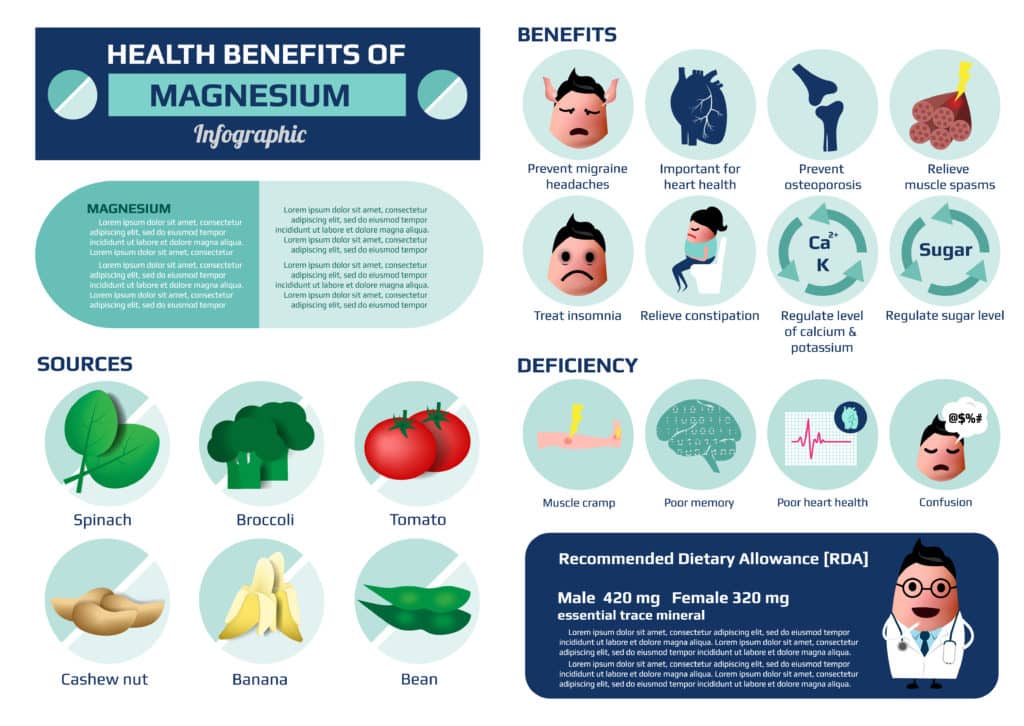These Emerging Benefits of Magnesium Glycinate Are Sure to Please
Magnesium Glycinate is also known as Magnesium Bisglycinate. It is the combination of two glycinate molecules bound to magnesium. This enhances its bioavailability or absorption.

Table of Contents
What is Magnesium Glycinate?
Magnesium is an electrolyte, and a mineral and glycine is an amino acid and when combined we have Magnesium Glycinate. Magnesium and glycine can be found in different foods. Minerals are found in fruits, vegetables, grains and meat, glycine can be found in protein.
However, magnesium glycinate is the chelation or bonding of magnesium (mineral) and glycine (amino acid) to increase their overall absorption.
What are the Benefits?
The benefits are that it magnesium glycinate especially in the bisglycinate form is highly absorbable. It offers the same benefits that supplementing with magnesium include such as:
- Blood Sugar Balance
- Better Quality Sleep
- Hydration (it’s an electrolyte)
- Help with headaches
- Reduces Stress & Anxiety
- Helps with Depression
Magnesium Rich Foods Include:
- Dark Chocolate (Real Chocolate, not Dove or Ghirardelli unfortunately)
- Bananas
- Green Vegetables & Algae
- Avocado
- Nuts
Where Can I Buy Magnesium Glycinate?
Magnesium glycinate can be purchased at your local health food store, this is the best option after purchasing them at Thrive Market. Thrive market is my favorite way to save time and money by grocery shopping without leaving my house and I am able to shop by my diet restrictions.
Thrive Market saves me money because I get free full-sized items almost every order.
You can also purchase from Amazon but be careful you are buying directly from Amazon or the supplement brand themselves. This ensures you get a quality product at the right price point.
Never leave your home and have your groceries delivered to your door! Here's why I LOVE Thrive Market
- It's a cheap membership
- I get free full-sized products every time I order
- The regular prices are cheaper than other large retailers
- They gift memberships to families in need when you sign up
- They sell TONS of organic, natural, non-gmo, sprouted, fair-trade, eco-friendly products
- You get free shipping on every order over $49
- Great Customer Service
- They offer meat, frozen items, baby products, and more
- You can shop by diet (gluten-free, dairy-free, vegan, keto, etc.)
- The reasons to join thrive are endless!!
How Should I Take Magnesium Glycinate?
Magnesium glycinate, just like any other magnesium can be taken at night in case you take too much, and it makes you a little sleepy. It is a great combination to take with melatonin for sleep because the two can really help you relax and stay asleep.
Magnesium is not always going to make you sleepy; it is found in many foods, and it can be taken in the morning or at night. However, as I mentioned if you are sensitive to supplements it is best to take it at night.
How much magnesium glycinate should I take?
A research study showed that taking magnesium for anxiety and depression, the individuals took between 125-300mg of magnesium glycinate or magnesium taurate (combined with taurine). They supplemented with this magnesium for at least 7 days and some saw relief from depression before the 7 days. (Eby, 2006)
Magnesium deficiency can be caused by a lack of magnesium in your diet, poor gut health, medications that deplete magnesium and stress.
So, the amount that you need personally is dependent on these factors that I just listed.
How much magnesium glycinate should I take to help me sleep?
Magnesium is beneficial for sleep and oftentimes individuals who struggle with depression or anxiety suffer from insomnia.
Because of this, your brain has a hard time shutting off and you often times being able to relax.
Magnesium supplementation was given at 500mg per night to older adults struggling with insomnia and they saw improvements in their sleep. In the study their sleep time was increased, along with their sleep efficiency along with their melatonin production. (Abbasi et. al., 2012)
References:
Abbasi, B., Kimiagar, M., Sadeghniiat, K., Shirazi, M. M., Hedayati, M., & Rashidkhani, B. (2012). The effect of magnesium supplementation on primary insomnia in elderly: A double-blind placebo-controlled clinical trial. Journal of research in medical sciences : the official journal of Isfahan University of Medical Sciences, 17(12), 1161–1169.
Eby, G. A., & Eby, K. L. (2006). Rapid recovery from major depression using magnesium treatment. Medical hypotheses, 67(2), 362–370. https://doi.org/10.1016/j.mehy.2006.01.047
Originally posted 2022-04-01 17:25:21.
Megan Santiago
Latest posts by Megan Santiago (see all)
- How to Find a Trauma Therapist in Tampa - September 30, 2024
- Get Your Child to Listen: A Clear-Cut Way To Feel Heard - March 10, 2024
- Help With Bills – How to Get Financial Assistance - March 10, 2024

